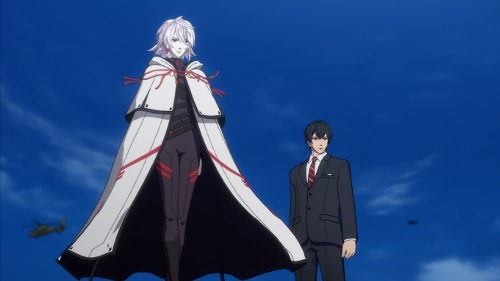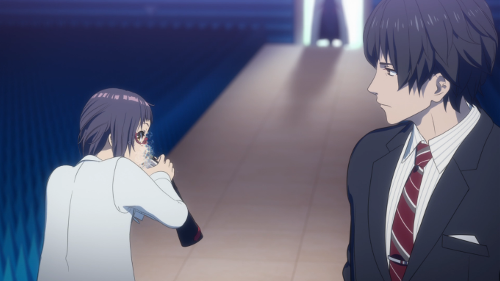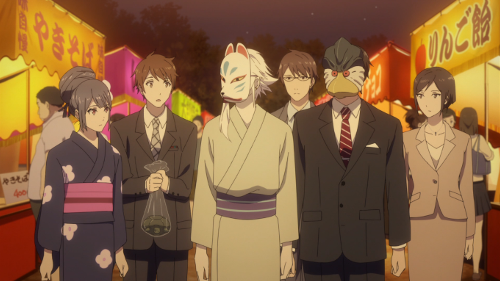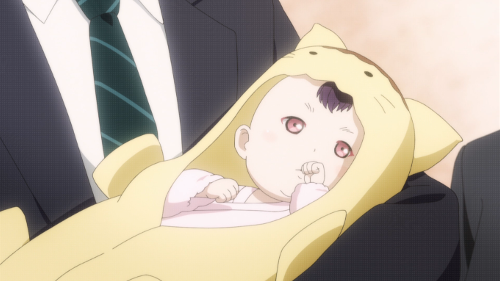KADO: The Right Answer began as one of the most intriguing shows that came out of Spring 2017 by raising interesting questions about societal advancement, geopolitics, and human nature. But, in its efforts to captivate its audience early on, did it misrepresent itself?
I started writing this post a couple weeks back when I began to doubt that the series would deliver on what I thought were its finer points, but waited until the finale to decide if this was the case. Judging from the post’s title, you might guess where I stood in the end.
This isn’t a purely critical post, though. There were a lot of good things about the series that may be beneficial to cover first, if only to provide context for where I think the it lacked focus. I mentioned that KADO was a very intriguing series, and a lot of that had to do with how it approached its subject matter. Its downfall was in its inability to follow through with most of it.
Why it Looked Good
The following points detail where I thought KADO was at its strongest and distinguished itself as an early standout this season.
Yaha-kui zaShunina made a huge impact

Not only did zaShunina make a splash, but the series presented his arrival differently than your run of the mill alien story. His gifts, in the form of Wam and Sansa, disrupted the way that economies, social systems, and people themselves fundamentally work. Instead of forcing his will on humans or attacking them to achieve his own ends, his goal was to lead them toward what he cryptically referred to as “the right answer.”
Japan’s response was rooted in mutual benefit

The narrative might have turned out far different had the JSDF been able to break Kado’s fregonics barrier, but the fact remains that Japan was willing to listen to zaShunina when it became clear he wanted to talk. This may be a political statement about the character of the Japanese government and zaShunina’s choice to land Kado among them – which is interesting to think about itself, but the key point is that the relationship between zaShunina and humans worked off the early theme of negotiation.
Different people responded differently

This was key in making the characters feel dynamic in personality and action. Whether it was Shinawa’s obsessive curiosity, Tsuraka’s mistrust, or Google Setten CEO Adam Ward’s lust for exposure that drove them, everyone had an agenda that hinged on each little development that took place.
It tackled philosophical questions

With zaShunina’s intentions kept in the backdrop, KADO explored seemingly deeper concepts. What would people do without want of energy? What could they achieve without need for rest? What was humanity’s potential, unhindered by the social constructs of class, nationalism and power struggle? It was as if the writer had sat down to ponder “the right answer” and created an anime about it. It’s the sort of anime that can be remembered for its brilliance, if done properly.
Where it Slipped
Some of this wasn’t apparent when viewing in real time, but a retrospective look at the events of the series reveal several unnecessary plot points and over-complications meant to manufacture a tense tone.
The plane and its passengers were inconsequential

I understood that the entire ‘hostage’ situation was meant as a way to give legitimacy to Shindo’s role at zaShunina’s side. The problem is that a number of complexities were introduced in these first few episodes that didn’t have any bearing after the passengers were released. The limits of Kado’s processing power and the challenges of conveying anisotropic concepts to humanity were made to sound important, but ultimately weren’t.
The outcome of these first three episodes was in developing a level of trust between Shindo and zaShunina, but the plot point which kept the characters and viewers engaged (the plane) becomes functionally irrelevant once Wam is introduced.
Moving Kado achieved nothing
Taking place at the series midpoint, “Tetrok” kept its big reveal for the very final moments of the episode. Coming off what was framed as a major turning point in providing a way for anyone to create Wam, the episode drops all the tension it had built for two episodes as the governments of the world debated control over the devices.
What was supposed to lead to widespread chaos or at least a revolution in the way everything in the world operates was ignored so the show could give us Shindo’s ‘brilliant’ idea to pivot Kado on its corner. On top of this, more ambiguous complexities like the need for the cube to remain in contact with the ground were introduced, as if solely for the purpose of making the cube’s movement a big deal.
The operation took up an entire episode. The physical requirements of Kado were never again directly touched upon. In all honesty, how much would the series have changed if the cube had manifested on top of Shindo and Hanamori during some negotiation by the lake?
Cliché festival episode was cliché

The very next episode, if you don’t count the recap, was where the series really began to show weakness. Depicting zaShunina’s exposure to human objects and practices began subtly with the books and Shindo’s bookmark gift. Having him experience the festival aimed for the same thing, but in a more trite, and still inconsequential way. A bit of a fun distraction, but absolutely nothing more than a distraction regardless.
This was doubly disappointing because the episode, entitled “Sansa” should have been much more focused on the second anisotropic gift. Like Wam, it had far reaching implications for the human experience, but it received even less attention than its predecessor. Setten broadcast it to the world. Some saw it, some didn’t. Nothing really changed for humans, but the “anisotropic sense” would be used loosely near the end to enable zaShunina’s final plans.
Saraka was an alien the whole time

This by itself isn’t bad, really. There are plenty of stories about alien falling in love with Earth and protecting it against their own kind. Superman did it, and for an anime example Dragonball Z’s earliest stories were exactly about that. The problem is that doing this changes her from one of the organic characters that made the series so interesting into a plot device.
A flimsy plot device at that, because the series couldn’t commit to one identity. Her constant blushing clashed too much against Shindo’s lack of personality and chemistry with her. Her ridiculous situation after his rescue killed any sense that she was a powerful being from beyond humanity’s understanding. Her desperation to force her way inside Kado was completely undermined when she was shown to be able to pop right in at the most dramatic moment.
Where it ended up
KADO did move in a clear direction after some point, despite its slips. What it was able to still deliver from then on, however, was severely hampered by where the story was taken.
zaShunina learned about humans
Judging from the last couple of episodes, this was probably one of the primary goals of KADO. zaShunina realized that that human beings were more than just an anisotropic singularity and a renewable source of information. Humanity was special in its ability to produce infinitely different results from the same input.
It was a good turn to see that ‘simple’ humans could still teach a more advanced being something. Saraka had discovered this in her many millennia among life on Earth, and it was something that zaShunina finally understood thanks to Shindo’s help. It didn’t stop him from killing Shindo or really change his character, but that’s another issue.
Humans and anisotropic beings can make babies

The strangest turn in the series was one of the only avenues toward a resolution the series had, given its direction. Shindo’s plan to give zaShunina more information than he’s ever seen had to be a human/anisotropic hybrid. Still, her extremely late addition made Yukika nothing more than a final twist and a convenient way to tie up loose ends.
Nanomis-hein makes everything irrelevant

It’s a literal deus ex machina waiting to happen. Saraka proved as much in being able to modify time so that Yukika matured to the point where she could stop zaShunina on her own. Like Yukika herself, it’s a method to unnaturally move the story in whatever way the writer sees fit.
A tool that can modify the constants of the universe is capable of anything, including nullifying the need for Yukika in the first place. Really, there was no way out of this. A device of infinite power breaks any story.
Result
So what did we get out of KADO and why did it bother me so much? It all goes back to the series misrepresenting itself. I can forgive a lot of the problems the series had. I’ve enjoyed plenty of anime that did a worse job at keeping on task and maintaining narrative cohesion. What irked me so much was that KADO could have been exactly what I thought it would be, but just chose not to.
It was still just an evil alien story

Ten of the twelve episodes were spent trying to get humanity to choose “the right answer,” followed by zaShunina just shrugging and deciding he’ll take everyone by force. This can be seen as a change in his character, perhaps brought on by his exposure to humans and all their flaws, but it was never depicted that way. He presumably wanted to do this all along and only held off because it would be easier if people chose it.
Thus we lose any unique strategy this anime had for the character that drove most of its narrative. He refuses to take Shindo against his will to avoid destroying his humanity, then decides the only option is to end his life. He learns that a biologically identical shell of Shindo has no value, then clings to his dead body like a grieving widow. He laments the thought of losing Shindo’s humanity and kills him within the same minute. His once intriguing character is reduced to villainous lunacy in the span of a half episode.
Everything was up to Shindo
Forget all those other characters with different motivations that drew my initial interest. Forget the Japanese government that did its best to balance the happiness of its people against concerns of forever changing who they are. Forget Dr. Shinawa and her curiosity about what more the anisotropic could teach her. Everything was ultimately up to Shindo as a representative for humanity’s collective will (most of whom have no idea what went on in that cube).
To make matters worse, he didn’t use the one thing his character was known for. Their exchange, while moving zaShunina to an emotional epiphany, wasn’t a negotiation. Shindo wasn’t able to make him understand humanity’s position and zaShunina wasn’t able to make Shindo accept his. Their whole battle and Shindo’s preparation for it was merely a sleight of hand trick on more than one level.
Philosophy is for chumps
Perhaps the most insulting aspect of this series is that it abandoned all critical thought by episode six. What could have been a unique look at humanity’s ever increasing desire for advancement was cluttered with clichéd character interactions, an ill fitting love story, and a plot about stopping the bad guy that’s been done countless times before.
The final episode robbed the story of all the groundwork that came before by removing the need for thought. The perspective zaShunina brought as a universal outsider was meaningless because we didn’t see any of it play out. Nothing that was supposed to intrinsically change the human condition remained behind. No one had to learn from their mistakes because Yukika took care of everything. In the end, KADO decided for you what “the right answer” was.
Your Thoughts
KADO was a miss for me, but how did your negotiations turn out? Did the story give you what you wanted, in a fair exchange for what you gave in return? Let me know in the comments.
Also, feel free to rate and let me know what you thought of this post.





Well…let’s start the negotiatons here then (sorry, that one was just too easy 😀).
I think pretty much everything in your post sums up my own feelings on this series as well. I loved Kado. I stumbled across it by mere accident, just browsing through Crunchyroll , and accidentally hitting the play button on a series that was still ongoing (I usually only watch shows when they are finished). But I was hooked on it right from episode 1. It had a unique way of executing a well trodden path: alien invasion. (Although to call it an alien invasion series would be to do it an injustice)
Everything it did was handled way differently than in series that had dealt with this subject before.
But….I always had my doubts about zaShunina. I said as much when I responded to Karandi’s weekly posts: I don’t believe that any one can be that friendly. Not with the gifts he kept presenting to humanity. Kado lured us into a false sense of calm. We wanted to believe that it could pull of something that pretty much no alien invasion series or movie has been able to do: end it on a good note and with an intelligence. But alas, it was not to be. Ofcourse we had to have zaShunina become an evil and totally crazy alien, and we had to have a fight (if you can call it that) end a series that had been so promising to start with.
That said….I still enjoyed it. Yes the end was certainly a let down, and a disappointment…but it wasn’t enough for me to completely ruin the experience. Overall I enjoyed it quite a lot. It gave us some very well written episodes, and had enough in it to provide a unique anime series. It was sad though that they were not able to maintain it right up till the end.
Anyways: your post was very well written as always…and I really enjoyed reading it. As mentioned above, pretty much all your thoughts echo my own. So: one more than: negotiations are over 😀
LikeLiked by 2 people
Lol, I was fully prepared for negotiation jokes when I posted this. 😀
That’s cool you found this by accident. I try to watch a couple shows in real time, just because it’s hard for me to catch up with them once they’re off most peoples’ radar. I knew from the first episodes of Kado that it was something I was going to want to keep up with.
I would have challenged anyone who watched episodes 0-5 and didn’t think there was something there. Those were some well done episodes and the content gave you a lot to think about. Of course zaShunina was still very suspicious, but part of the fun was in trying to understand just where everything would go wrong.
For me, I thought it would be the conflicting viewpoints on how to use the gifts. The questions raised in this series were very relevant to the human experience, so I figured the series would be about humanity’s identity and how it dealt with these sweeping changes.
In any case I’m glad you still enjoyed it. It did try some unconventional ideas even if they didn’t pan out, so I give it credit for that. Thanks for reading, and for your kind words about my post. Always a pleasure to hear your thoughts.
LikeLike
This was a nice read Weekend! Well done
LikeLiked by 3 people
Thank you so much, Prattle! I’m really glad to know you enjoyed reading it.
LikeLiked by 1 person
A shame Kado didn’t keep the story it was building – I haven’t watched it yet because I wait for shows to end before doing so, but I’ve been reading people’s posts about them and it’s the only show in Spring that made me want to watch it that wasn’t a sequel to a pre-existing series. I’m still going to watch but hearing the 2nd half gets cliche is sad, but makes sense. In the end, creators would rather make something that already is shown to be successful rather than take a leap of faith into such a broadly speculative genre, like it sounds like Kado started out as.
LikeLiked by 2 people
A shame indeed. Clichés I can handle, but wasted potential is so much more disappointing for me.
I can’t totally recommend this to anyone as I feel that its really interesting first half just falls apart in the second. But If it still sounds good to you after reading this post then sure, go for it. At the very least it offers some unique elements that are sure to garner some thought.
At the very least I don’t want to discourage something like this. I would love to see more shows take some bold steps, but gah, follow through!
LikeLiked by 1 person
Nicely done. I think you’ve really summed up where this went wrong despite the fact that it had every opportunity to save itself. I still enjoyed this series but the ending was a definite miss.
LikeLiked by 1 person
Thank you! I do feel like I complained a bit much but I really wanted this show to be good. All of this was kind of what I was talking about when I told you I thought the series had a focus problem, but I figured I could say it better with a post than I could in a comment box.
I might be able to see KADO in a better light someday, but for now we need some time apart.
LikeLiked by 1 person
I need to redraft my series review of this one. The episode review can stay as is but the series review needs to reflect the positives the show has. Even with that end it is still an intriguing watch even if it is ultimately disappointing.
LikeLiked by 1 person
Absolutely fantastic read that sums up my own feelings about the series pretty well.
I’d hoped this would turn out to be a real masterpiece by the end, as the show opened very strongly, but sadly that wasn’t the case.
It’s a real shame.
LikeLiked by 1 person
Thank you very much, Leth. I’m glad I could capture a lot of the things the community was feeling, though a lot of these were bright red flags.
This definitely had a masterpiece level start that got me really excited after the initial episodes, so it really is a shame it didn’t retain that quality.
LikeLiked by 1 person
I never got around to watching this but KADO’s stengths and weaknesses were very easy to understand from your post. A shame it became unsteady halfway into the season. Thank you for such an interesting read!
LikeLiked by 1 person
Seems like I picked on its weaknesses more than highlighting its strengths, but I’m glad this was useful for you!
LikeLiked by 1 person
I don’t trust Google either. Why did they change the slogan of “do no evil” to “do the right thing?”
LikeLike
Because they finally figured out what the right thing is, from reading your emails and tracking your internet activity. Now all that’s left is to guide you toward it.
LikeLiked by 1 person